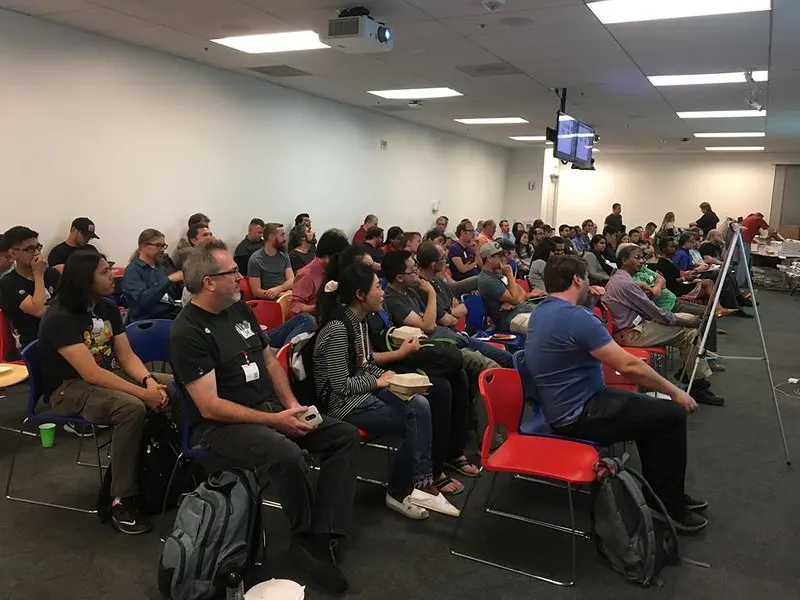[0700.. 0800] Lingfei Meng (MuraVision) - Muravision makes a device that does scan-based PBR texturing. He will be there to give a brief talk on PBR textures and also to give a live demonstration.
[0800..0830] Josh Carpenter and Iker Jamardo (Google) - Experiments in AR for the Web
[0830..0900] Gareth Morgan (Axum Graphics) - Axum Graphics is developing, Auteurist. It is an entirely WebGL-based 3D content creation tool for filmmakers, that renders photo-realistic video (both conventional and 360-degree).
[0900..0930] Jamieson Brettle (Google) - Overview of the Draco project which is focusing on compressing 3D assets for delivery on the web. They are working towards having Draca be part of the glTF2.0 specification.
[0920..0940] Will Eastcott (PlayCanvas) - PlavCanvas has some exciting updates to share with the group having to do with AR....
[] Tony Parisi (Unity) - Tony will give us an update on the state of glTF. *IF* he's not traveling to New York on the 28th.
MURA vision
- Lingfei Meng
- pbr based texture scanner
- http://www.muravision.com/
- BRDF - Physically based rendering
- scanner can scan 20cm x 2cm
- Big one can scan 50cm x 50cm
- demo_sektop_scan
- scanner to get -> color, diffuse, specular, opacity, roughness, depth, glossiness, normal,
- mamoset toolbag 3.03 -> very simple renderer
- business model: sell the scanner($90k) or sell the scanned material ($130 per scan)
- application: subscantance designer
- PBR : glossiness, mathematical representation of texture
- packages in mdl.
- depth 16 bit, others 8 bit
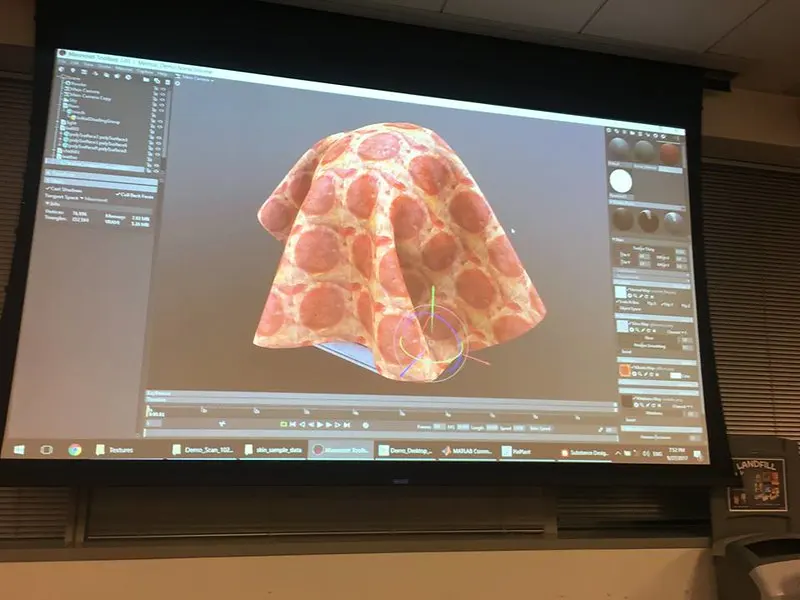
The Argumented Reality Web
-
Iker Jamardo (daydream webxr tech lead) @judax & Josh Carpenter (ux lead, daydream webxr, canadian) @joshcarpenter
-
Argon Browser v4, AR browser for mobile
-
AR.js https://github.com/jeromeetienne/AR.js/blob/master/README.md
-
AR + ARCore, uses webasembly
-
hundreads of millions of devices will soon have basic AR capabilities
-
WebAR at I/O, Tango project
-
these builds were build on top of WebVR 1.1 and enabled
- accurate motion tracking
- way to composite the pass through camera feed and the virtual scene
- a way to understand the world
-
ReactVR
-
Room scan => from tango device
-
Space Puppy,
-
point cloud
-
from these builds, we learned
- that being able to synchronize the motion tracked pose and the rendering of the pass through camera feed in Chrominum is not trivial, as WebGL’s command buffer makes rendering asynchronous..
- That the initial names for the new features were not ideal!
-
Fast forward to august
-
WebARonARcore,
-
WebARonARKit
-
expose an experimental API extension to WebVR 1.1. to privide AR capabilities on top of IOS ARKit and Android ARCore:
- 6 DOF device motion tracking: through the webvr 1.1 api
-
Goal:
- Learning from ARKit and ARCore APIs
- Explorer AR integration in the browser stack
- enabling delveopers to experiment early
-
https://www.wired.com/story/google-joins-the-augmented-reality-party-with-arcore/
-
community experiments
-
webgl based graffiti
-
expose plannes -> surfaces
-
UJI primitives
-
three.js + css only -> made an AR, google doodles!
-
We also seen similar hybird apps
- active theory thee.js-powered arkit app
- sketch fab arkit app
- mobizlla webxr for iso: github.com/mozilla/webxr-ios
- stink stuidos’ arkit-web’ :github.com/stinkstudios/arkit-web
-
What’s next
- explanier for AR on the web
- coorporation between borser vendors
- protyping use cases and design principles
-
all will be opensource in 2 weeks
-
building with webgl + special version of chronmnium
AAutheurist
- Gareth Morgan (Axum Graphics)
- WebGL based contents creation tool
- announcement: W3C november 6th, session at 1:30pm declarative web vr
- https://axumgfx.com/
- 360 degree video
- conventional video
- stereoscopic 360 video
- browser based => rendering on the cloud
- frontend: three.js, backend: python flask, mongodb
- render farm with radeon pro -> streaming services
- final output render to vimeo
- https://vimeo.com/ => vr video, sample 260 degree video
- https://www.axum.graphics
- raedon renderer pro??
- using renderstorm for backend
Draco 3D Compression
- draco -> 3d compression codec for web, opensourced since jan 2017
- https://codelabs.developers.google.com/codelabs/draco-3d/#0
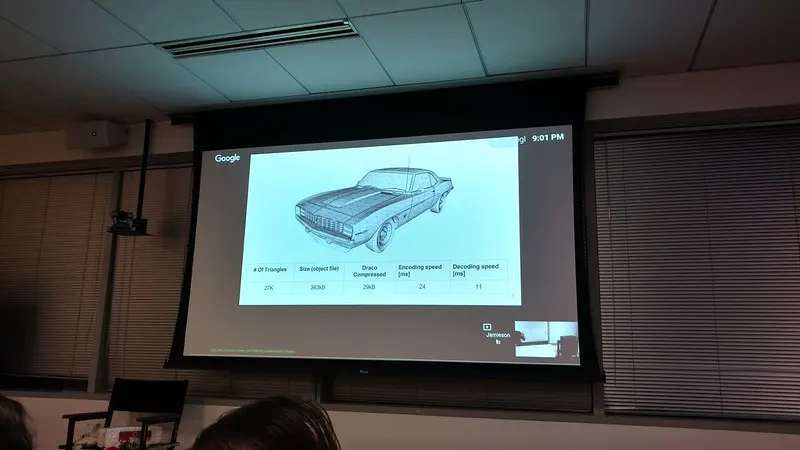
- super fast on the web
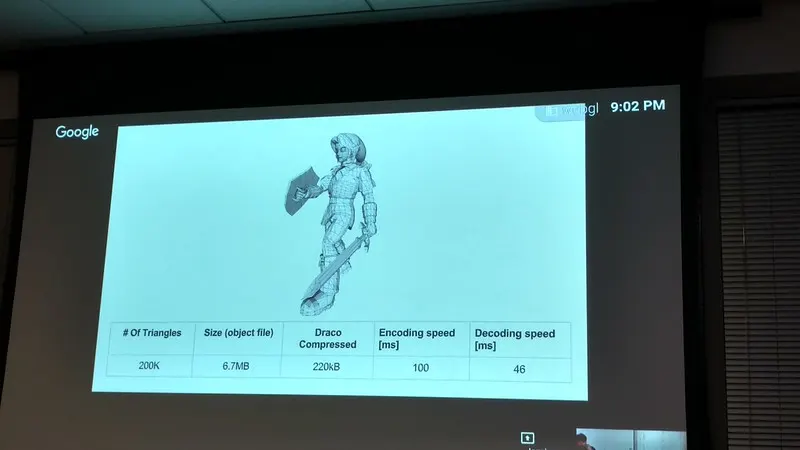
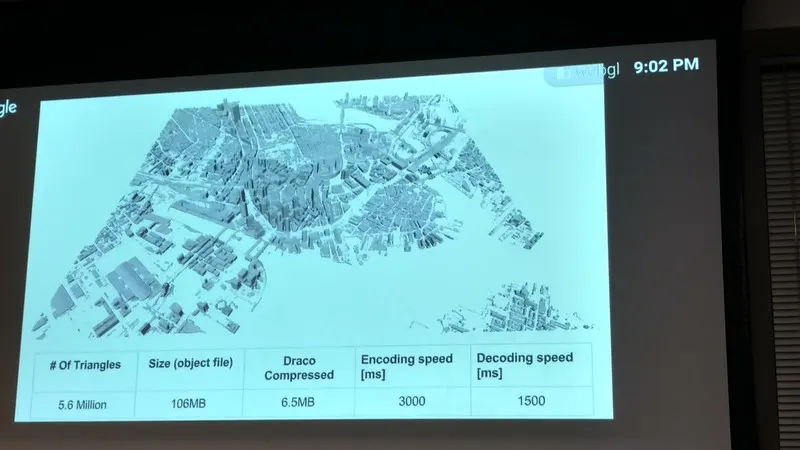
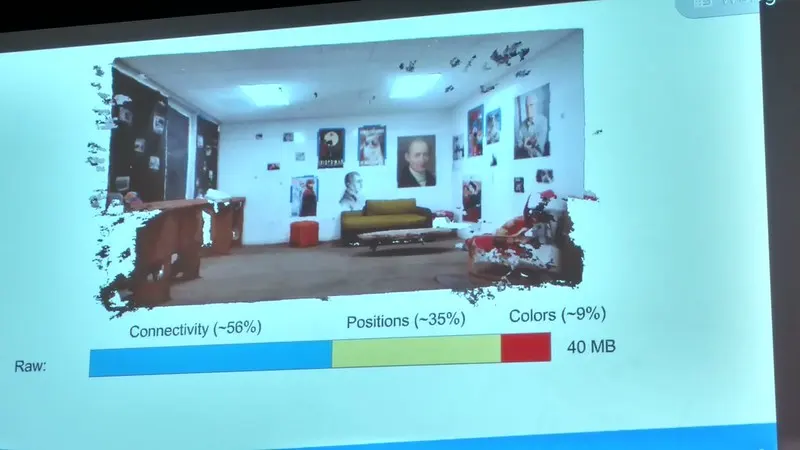
- Jamieson Brettle (Google)
- compare gzip vs draco
- encoder.decoder just released encoder
- draco 1.x release
- webassembly decoder, 2x faster decode speed,
- js encoder
- npm package
- draco extension to glTF 2.0
- glTF 2.0 renders with draco
- three.js
- babylon.js
- sample models
- https://goo.gl/s8Acmd
- accessing draco
- Songbird
- https://github.com/google/songbird
- creating and rendering ambisonic signals
- written in js
- raytracing in sounds
- recalcualte the sound source based on the postion of the actor in the scene
- adding a source
audioElement.play();
- paranode? compatitor of songbird
PlayCanvas
-
the web-first game engine https://playcanvas.com/
-
https://github.com/playcanvas Will Eastcott (PlayCanvas), since 2011
-
platform for making interactive contents
-
like unity, runs on browser
-
playcanvas ar ->
getUserMedia/Stream API
- you can now make browser based AR with JS
- capturing the camera stream
var constraints = {}
var promise = navigator.mediaDevices.getUserMedia(const)
promise.???
var vide = document.createElement(;video')
video.setAttributes(''); # for full screen
video.srcObject = stream;
- playcanvas editor and code
- creating AR marker on the playcanvas editor with ui or code
var hiro = new pc.Entity("Hiro Marker")
hiro.addComponent("script")
hiro.script.create("arMarker", {attributes: {}});
app.root.addChild(hiro)
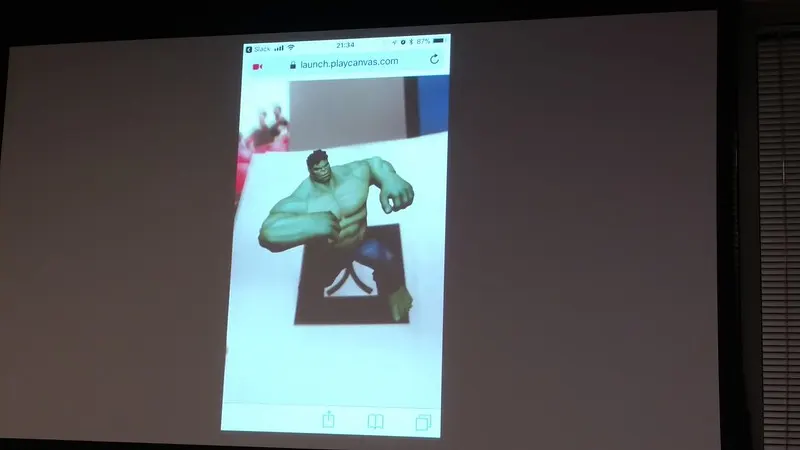
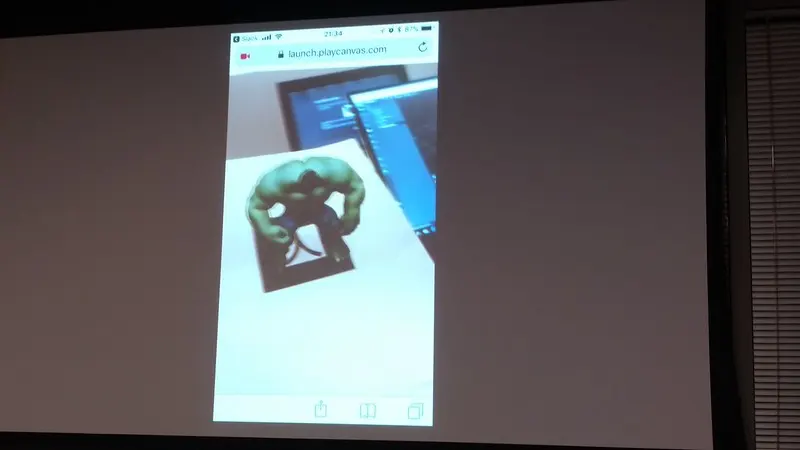
- problem with ARtoolkit
- requires printing of markers
- sensitive to lighting conditions
- sensitive to camera hardware
- cpu intensive
- hiring WebGL ninjas
- animation FBX, -> converted the json. keyframe
- 150kb library
